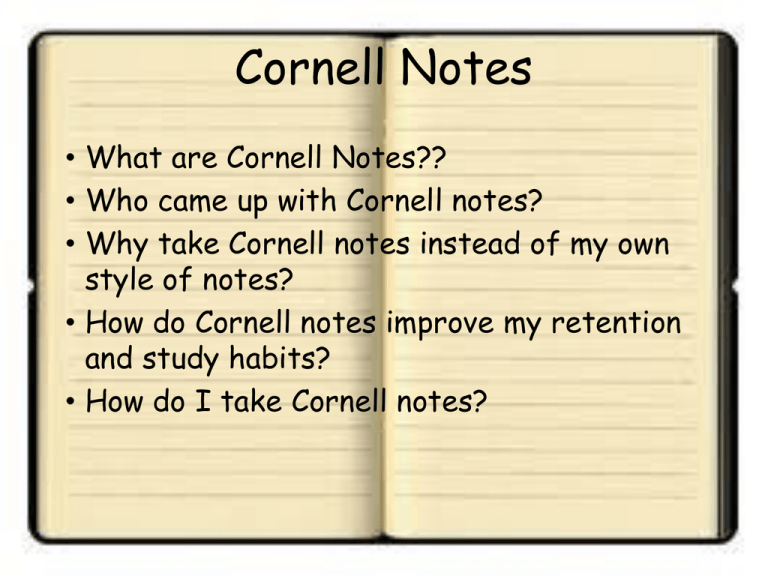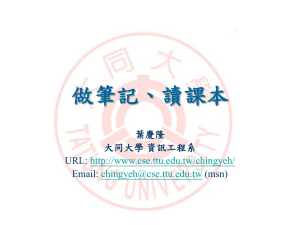Cornell Notes
advertisement

Cornell Notes • What are Cornell Notes?? • Who came up with Cornell notes? • Why take Cornell notes instead of my own style of notes? • How do Cornell notes improve my retention and study habits? • How do I take Cornell notes? Cornell Notes What are Cornell notes?? • Cornell note-taking system is a widely used note-taking system in which your notes are organized in a systematic format. Cornell Notes Who came up with Cornell notes?? • In the 1950’s, Walter Pauk, an educator professor at Cornell University, devised this note-taking system. • The notes were originally designed for college students, but over the last decade, this method of note-taking has been used in high schools. Cornell Notes Why take Cornell notes instead of my own style of notes? •Cornell notes are a systematic way of effectively organizing your notes without any extra effort. •It is a guide for students to become more organized and to be able to better understand their notes when they go back to study. Cornell Notes How do Cornell notes improve my retention and study habits? •Cornell notes are designed to have the student retain the information presented by seeing it at least three times. • First, you write your notes. • Second, you go back, look at the main sections, and create a unifying question that prompts you to recall the information. • Last, you write a summary at the end of the page the sums up the key points on that page. Cornell Notes How do I take Cornell notes? • First, you draw two lines on your paper to divide it into sections. • The first line is drawn down the left side with about a 2 ½ inch margin. • The second line is drawn about 2 inches from the bottom. Cornell Notes: How To Put your name and date on the top of the paper with the class subject in the middle. First, draw a line on the left hand side. Leave about a 2 ½ inch margin. Next, draw a line about 2 inches from the bottom. When you are finished, your paper should look like this: Name Date Subject Cornell Notes: How To In the middle of the paper is where you take your notes. This is done during class. Skip lines between topics so you know where one ends and the other begins. On the left hand side, you put questions and main ideas that prompt the main points in each section. Do not answer the questions!! Each section should be separated by skipped lines. You do this after class. In the summary section, you put the main ideas and key points of the lecture to show you understand what is important. This is done after class. Name Date Subject CUES: NOTES SECTION: Record the lecture here, • questions using: • main ideas that connect points • diagrams • prompts you to help you study • • • • • concise sentences shorthand symbols abbreviations lists skip spaces between topics SUMMARY: • top level, main ideas • for a quick reference Cornell Notes • So let’s do an example using this presentation and these notes as an example. • On your paper, your notes, cue section, and summary section should look something like this: Cornell Notes: Example Ms. Kovach 20 August 2010 What do we notice? Physics: Cornell Notes The NOTES (yellow) are abbreviated and NOT word for word. The CUE section (blue) has questions to remind us of the topics. The answers are NOT given – you should look at the questions when you study and form your own answers. The SUMMARY section (red) has the main points and the answers to the Cue section. It is very short. Objectives: • 5 main points What are Cornell Notes?? Who came up with Cornell notes? Why take Cornell notes instead of my own style of notes? How do Cornell notes improve my retention and study habits? • How do I take Cornell notes? • • • • What are Cornell notes? What are Cornell notes?? • widely used note-taking system in which your notes are organized in a systematic format. Who created them? Who came up with Cornell notes?? • 1950’s, Walter Pauk, at Cornell University What is the purpose? Why take Cornell notes instead of my own style of notes? • organize your notes without any extra effort. • better understand notes when going back to study. How will they improve my grade? How do Cornell notes improve my retention and study habits? •seeing it at least three times. • First, you write your notes. • Second, create a unifying question • Last, you write a summary Cornell notes are a note-taking system developed by Walter Pauk in 1950. They are used to better organize your notes and promote better retention by seeing the notes at least three times. Cornell Notes • This is the format you are expected to take your notes in. • I will check for your cue sections and summary sections. This will be a homework grade. • ANY QUESTIONS??







